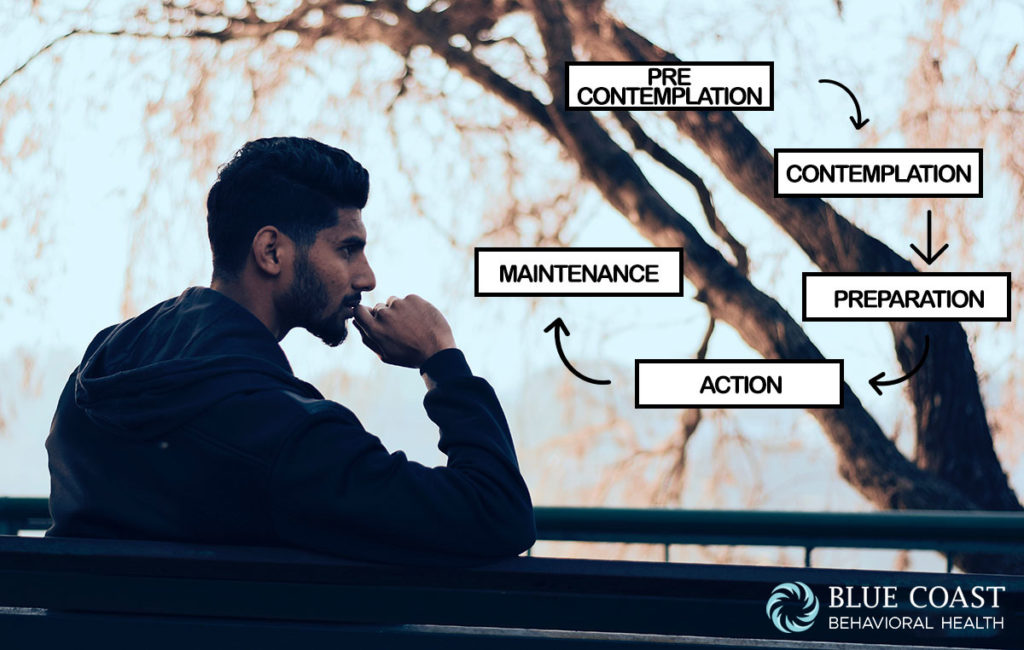Watching someone you love fall deeper into the toxic behaviors spawned by their addiction is torture. Among other things, it no doubt led you to do a quick Google search: “How to overcome addiction?” You’ve likely tried many tactics to get your loved one into treatment to no avail. Or perhaps you, yourself are struggling with addiction and are trying once again to fight the disease. Maybe you’ve diagnosed yourself and even did some digging on a treatment facility’s Facebook page. But something keeps holding you back.
You’ve found yourself somewhere along the stages of change.
What Are the Stages of Change?
The stages of change model is a process by which addicts overcome addiction. The stages are generally presented as a cycle. Recovering addicts are thought of as flowing through the cycle sequentially. The reality is that a person can — and often does — jump back and forth through the phases depending on their circumstances. But laying the stages of change out as a sequential model gives a structure to the changes a recovering addict goes through and allows for management and encouragement.
Stage 1: Pre-Contemplation
“I don’t have a problem.”
People in the first stage of the stages of change, pre-contemplation, don’t see their behavior as a problem. They’re in active addiction at this point.
In the pre-contemplation stage, addicts often don’t experience or realize severe negative consequences. Because of this, they have no intentions of changing their behavior or quitting their addiction. They’re also likely not interested in hearing about the potential of negative consequences or ways they should seek help. Once an addict starts to experience negative consequences and sees other parts of their life impacted by their drinking/using, they’ll begin to progress through the stages of change.
Stage 2: Contemplation
“Maybe I do need to change.”
Addicts typically start to experience negative consequences in the contemplation stage. These impacts will push the addict to start thinking about their drinking/using as an issue. However, no action occurs at this point.
Because they’re starting to see some cons and reformulate an understanding of their substance use, an addict can remain in the contemplation stage for years. But the idea of seeking help does start to form, so an addict in this stage may be more open to receiving non-judgmental information and encouragement.
Stage 3: Preparation
“What does change even look like for me?”
At this point, an addict is preparing to carry out the changes contemplated but they don’t quite take action yet. They may swing back and forth between decisions, as taking action means a huge lifestyle change.
An addict can find themselves stuck in this preparation stage because both the compulsion to get help and the compulsion to keep drinking/using are at war. It’s overwhelming. Addicts are bombarded with feelings of guilt, which trigger ideas of action. But then they can find themselves lost in feelings of desire and purging. Each swing is just a building block of procrastination. When the wall of procrastination finally gives way, the addict will progress to action.
Stage 4: Action
“I need help.”
The action stage is the key focus stage for anyone trying to overcome addiction. This is where the stages of change model actually sees change. The ideas formed in the contemplation stage and the plans set in the preparation stage finally land a struggling addict with an admission to a treatment facility.
Stage 5: Maintenance
“I can do this.”
The maintenance stage is where the recovering addict focuses on continuing to achieve the progress set forth in the action stage. This is where behaviors are modified for long-term recovery.
It’s important to actively maintain recovery rather than becoming complacent, as relapse is still a very real factor in this stage. But with proper support, goals, and a solid foundation created in treatment, long-term sobriety/recovery is entirely possible.
If you or a loved one is seeking help for substance abuse, our addiction counselors are available by phone 24/7: 714-203-2708*
*all calls are answered by New Start Recovery




